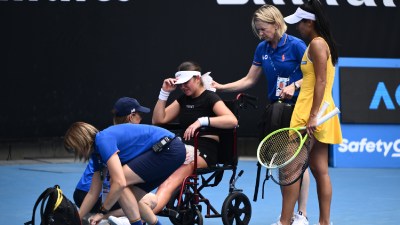Desist from a second blunder
A fortnight ago, Uma Bharti and I appeared in a talk show. Her body language was not the same any more. She was restrained and conciliatory...

A fortnight ago, Uma Bharti and I appeared in a talk show. Her body language was not the same any more. She was restrained and conciliatory in her tone. I concluded that she was trying to represent a liberal8217; and moderate face of the BJP. It was not before long that I realised that my optimism was misplaced. One felt cheated when the Chief Minister of Uttar Pradesh, Kalyan Singh, declared his commitment to the rebuilding of the Ram temple at Ayodhya. Was the Chief Minister speaking out of turn? Or did he have the BJP8217;s mandate to announce his plan? If so, was Uma Bharti aware of the happenings in her own party?
Whatever his political compulsions, Kalyan Singh should not be allowed to disturb the status quo in Ayodhya. Somebody should remind him of the people8217;s verdict in November 1993. That was when the BJP, fresh from its victory8217; in Ayodhya, suffered major electoral reverses in his home state and in Himachal Pradesh and Madhya Pradesh. He had stated that if his party got even one seat less than the 221 it held in Uttar Pradesh, it would be tantamount to a rejection of the mandir movement. In the event, the party lost 44 seats.
Consider your priorities, Mr Singh. Turn to your own state and address yourself to those millions of poverty-stricken people who have yet to receive a fair deal and whose basic needs still are roti, kapada aur makaan. Your state, which has been ill-served by politicians of all hues since Independence, lags far behind other regions. You will find a place in history not by building a temple but by setting up industries, creating job opportunities and building the infrastructure for future growth and prosperity. You need not spend sleepless nights over the mandir. Surely there are enough Ram mandirs in our villages to offer spiritual solace to their bhakts devotees?
You preside over the destiny of a state that was once the symbol of composite and syncretic living. Although its political landscape changed with the rise of Muslim nationalism8217; and Hindu militancy, different communities continue to live in amity and share the values of pluralism and multiculturalism. An inspiring legitimation of the more mundane expressions of peaceful coexistence comes daily in the sounds of Muslim shehnai mingling in the arti of Hindu temples of Banaras, including that of the sacred Vishwanath temple. Why then introduce a discordant note with the mandir issue? Why rake up divisive issues that lay dormant for decades? Why create a cleavage amongst your own people? Is it not possible to cite historical precedents to unite people around symbols of unity and mutual cooperation? Instead of reminding your audience of what Babar or Aurangzeb did, why not talk of Amir Khusro, Malik Mohammad Jaisi, Rahim, Raskhan and Dara Shikoh?
As the head of the most populous state, you are accountable to the nation at large. Without commenting on the conduct of our leaders or the legitimacy of this government, I wish to underline the visible signs of social change and economic progress. Life will not be the same if the Babri masjid issue is politicised for short-term electoral gains. By raising the communal temperature, you would be acting against the larger interests of the people.
Today, the redeeming feature is that socio-economic matters figure more prominently on everybody8217;s agenda, while the country is not polarised along religious lines as was the case during the Babri masjid-Ram janmabhoomi controversy. Whether in Uttar Pradesh or Bihar, caste rather than community is the focal point of mobilisation. The liberal and secular voices among Muslims are being heard loud and clear. Hindu and Muslim communalists stand isolated. This explains why these states have been free of Hindu-Muslim strife.
In other words, Mr Chief Minister, it is possible to avoid the communal claptrap and forge a joint front to promote a specifically socio-economic agenda. Muslims of Uttar Pradesh, who are quite numerous and influential in several areas, should be made a part of, and not isolated from, such a front. If you want them to feel safe and secure in their own state, you would be ill-advised to repeat the monumental folly you and your government committed on December 6, 1992. If you want your public image to be restored, you would do well not to be swayed by Hindutva rhetoric.
As a general rule, we must not destroy or vandalise places of worship. India has been the home of many religions. The country has been partitioned once before owing to the nefarious role of the British administrators and the miscalculation of our political leaders. So please don8217;t become a crusader and start targeting mosques, gurudwaras, churches and synagogues. Enough is enough.
What we need today is a Naya Shivala new temple, the dream of poet Muhammad Iqbal. Please pay heed to his following advice:
Let us reconcile those that have turned away from each other/Remove all signs of division/Desolation has reigned for long in the habitation of my heart-/Come, let us build a new temple in our land./Let our holy places be higher than any on the earth,/Let us raise its pinnacle till it touches the level of the sky;/Let us awake every morning to sing the sweetest songs;/And give all worshippers the wine of love to drink./ There is power, there is peace in the songs of the devotees-/The salvation of all dwellers on the earth is love.The idea of a referendum on the Babri masjid, aired in certain quarters and welcomed by some BJP leaders, must be promptly rejected. Such an emotive issue, which has been so highly politicised by the Hindu and Muslim firebrands, cannot be resolved through a popular vote. Second, there is no precedent of a referendum having taken place in India. One wonders why the Congress did not press for a referendum on the Pakistan issue? Had they done so, the Muslims may well have voted against the Partition. Who knows?
The Constitution, too, makes no provision for a referendum. An amendment at this stage would be politically inexpedient. Moreover, a referendum makes sense in countries with a literate and relatively homogeneous population, but not in a country of our size and diversity. Finally, has anybody considered that a referendum on the Babri masjid is fraught with serious consequences? What if the BJP demands one on a uniform civil code? Would the self-styled Muslim leaders agree? Let Mr Salman Khurshid answer.
- 01
- 02
- 03
- 04
- 05































